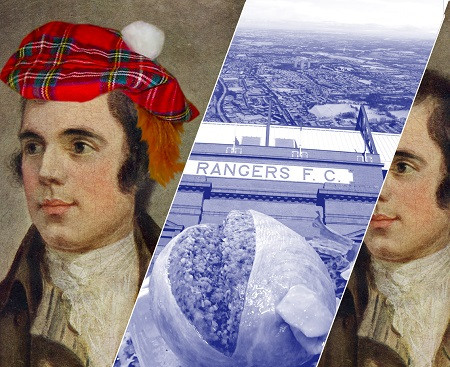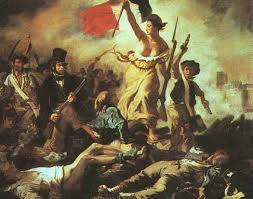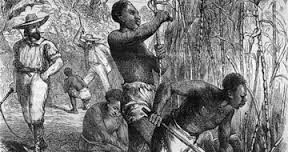Robert Burns: Paradoxical Bard who championed freedom and wanted to work as slave driver in Jamaica

Like a split personality, the divide between Scottish identity and what it means to be British is embodied by the paradoxical nature of Robert Burns. For example, the Bard who wrote about fighting for liberty in the face of "chains and slaverie", purchased a ticket to go and work on a plantation in Jamaica as a "negro driver".
In Burns' day, Scotland was a nation traumatised by industrialisation, the rise of cities and mass emigration. He came to symbolise the vanished certainties of an increasingly mythologised rural past. The sentimental image of Burns has kind of married the political one, constructed out of national feeling, celebrated in museums, anniversaries, commemorations and written histories. The political Burns is the radical supporter of the American and French Revolutions, whose poems and songs were sung by those fighting for democracy and social justice.
Burns' radicalism is constructed around significant events in his lifetime, the main one being the French Revolution, but also Tom Paine's radical pamphlet "The Rights of Man". The wealthy and powerful people in the UK were consumed with paranoia about the French Revolution and the mass distribution of Paine's ideas, which meant Britain had become a virtual police state.
Therefore Burns tackled these ideas in his poetry obliquely. This is not surprising. In 1793, Burns was effectively on trial because a government spy had told his employer, Her Majesty's Custom and Excise, that he was head of a group of Jacobin sympathisers. The Jacobin Club (Club des Jacobins) was the most famous and influential political club in the development of the French Revolution. Burns denied all the charges.
Robert Burns was born in in 1759 in Alloway, just outside Ayr, the eldest son of seven children in a single-roomed cottage.
By the age of 15 he was working as farm labourer. Like his father, Burns had a stab at being a tenant farmer but found it hard to make a living.
Despite his poems being widely acclaimed, Burns failed to find a wealthy patron. Eventually in 1789, he moved to Dumfries and took a job as an excise man (a customs officer), which he held until his death in 1796.
This helps understand Burns' divided personality; following a two year silence he privately and anonymously wrote "A Man's A Man for A' That". At the same time he seemed loyal to his employers, HM Revenues and Customs. Taking that expediency to some lengths, in 1795 he signed a petition to set up the Dumfries Volunteers to resist a French invasion and wrote them an anti-French anthem.
Burns couched the anonymous publication in 1793 of "Scots Wha Hae" in the context of the Scottish victory over the English in 1314 at Bannock Burn, invoking William Wallace and Robert the Bruce in the name of equality, liberty and fraternity.

The publication of "Scots Wha Hae" coincided with trial of the most prominent Scottish champion of the French Revolution Thomas Muire. It is rather ironic that this song, which become a contender for Scotland's national anthem, states that losing the battle for freedom will mean "chains and slaverie".
Wha will be a traitor-knave?
Wha can fill a cowards' grave?
Wha sae base as be a Slave?
—Let him turn and flie.—
The mention of slavery here, and in other poems by Burn is very problematic. One aspect of Burns' life that is deeply uncomfortable to modern Scotland concerns his plan to work on a plantation in Jamaica. It is now widely known that Scotland's national bard was preparing to travel to Jamaica in 1786 to work as what he calls a "negro driver" on a slave plantation. He hoped to escape the hardships of the life of a tenant farmer, as well as the irate father of pregnant Jean Armour.
The publication of Burns' first collection of "Poems, Chiefly in the Scottish Dialect" (1786), known as the "Kilmarnock edition" was intended to raise funds for the voyage; Burns reports that his very first purchase was the nine guinea fare across the Atlantic.
Burns' Jamaica plantation plans are studiously avoided. "The voyage was postponed however and the success of 'Kilmarnock' meant the plough driver was able to avoid the post of 'negro driver' by pursuing instead literary fame as a 'quill driver' in Enlightenment Edinburgh," states historian Michael Morris.

This didn't stop Burns becoming an emblem of "mutual sympathy" for contemporary abolitionist poets, however.
The truth about Burns is that he cannot be reduced to an emblem of social justice, or some lost rural Eden, or a radical supporter of the French Revolution or anything else. But this is not to say his politics were muddled and inconsistent.
We should remember that he was writing poetry and not political philosophy and as such was not aiming for strict consistency or logical coherence. He could oppose monarchical absolutism, while still cherishing the House of Stuart as a symbol of national pride.
And while most commentators hold the French Revolution to be the alpha and omega of Burns' political consciousness, historians like Liam McIlvanny have sought to show that many of the poet's political works were written three years or more before the fall of the Bastille.
Research on popular radicalism has focused on how politics were informed by subtler factors such as dissenting Scottish Presbyterianism, with its subjugation of all forms of authority to the tribunal of individual reason.
In this analysis Burns' political writing becomes more complex and sophisticated than just the venting of lower class spleen, or espousing fashionable French extremism. Even his subversive erotic poems have been described as "political bawdry". As Burns' famous biographer Thomas Crawford wrote "Almost everything Burns wrote was political in the broadest sense."
Further reading:
Robert Burns: Recovering Scotland's Memory of the Black Atlantic, Michael Morris (2013)
A People's History of Scotland, Chris Bambery (2014)
Burns the Radical, Liam McIlvanney (2002)
Burns: A study of the Poems and Songs, Thomas Crawford (1960)
© Copyright IBTimes 2025. All rights reserved.






















